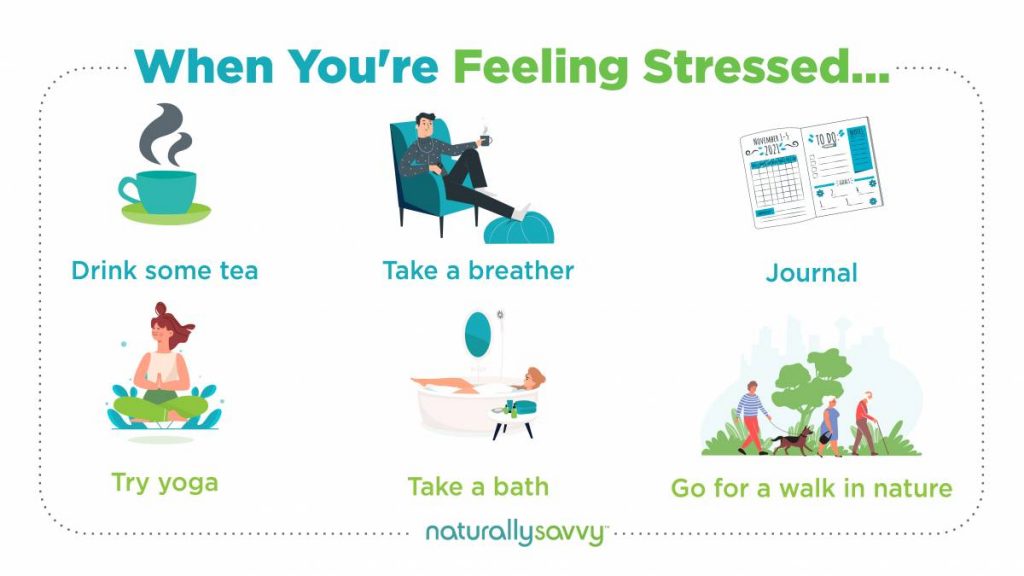
Summer is the time of year when we often experience “go back” stress. You know, the stress you feel when you have to go back to work after a vacation or get your kids ready to go back to school (buying school supplies and clothes, changing teachers and schools, and so on). How about the stress you may feel when you have to go back to your old routines after the kids are back in school? Yes, change can be very stressful!
Stress affects everyone at some level and to various degrees of severity. About one-quarter of Canadians in a survey say they experience a high degree of stress. The Child Mind Institute reminds us that some children experience a great deal of stress and anxious feelings when they return to school in the fall. This can be especially true for those going to kindergarten or entering a new school. More than 75 percent of adults report symptoms of stress such as sleep problems and headache.
Read about 11 ways to relieve stress in your life
How stress affects body and mind
When you are faced with a stressful situation, your body’s stress response system kicks in. The hypothalamus in your brain starts the ball rolling with a combination of hormonal and nerve signals. The adrenal glands release stress hormones, including cortisol and adrenaline. The former curbs functions that aren’t necessary in a fight-or-flight situation, such as growth, digestion, and reproduction and modifies immune system response while increasing glucose in the bloodstream. The latter boosts heart rate, blood pressure, and energy supplies.
When stress is acute or short-term, your body’s processes and functions quickly return to pre-stress levels. However, if your stress response system stays on overdrive, cortisol, adrenaline, and other stress hormone levels can stay elevated and lead to a variety of health problems. You can be at increased risk for stroke, heart disease, digestive problems, weight gain, muscle pain, insomnia and other sleep disorders, high blood pressure, and memory impairment, among others.
How to handle stress
Although stressors are everywhere, so are ways to handle stress. All it takes is a willingness to try them and find one or more that works with your age, health status, and lifestyle.
Did you know that volunteering can greatly relieve stress? In a new study involving more than 1,300 middle-aged and older adults, the authors reported that “the stress-buffering effect of volunteering contributes to improved emotional well-being for participants who volunteered on a daily basis.” Giving back is a way to restore balance and harmony in your life.
Some form of physical activity or exercise, for example, can be highly effective at managing stress. This may take the form of participation in sports such as baseball or tennis, doing Pilates, walking or jogging, dancing, or going to a gym or aerobics class, to name a few.
Many people find success using mind/body techniques. Meditation, guided visualization, deep breathing exercises, self-hypnosis, progressive relaxation, massage, yoga, and tai chi are some examples. Stress management can also take the form of self-love: taking time to do something special for yourself, such as getting a manicure, going hiking in nature, taking up a fun hobby, writing in your journal (or starting one), or setting aside 30 minutes every day to just be alone with a cup of tea and a book. Find fun ways to cope with the stressors in your life.

Read about healthy habits for handling stress and anxiety
Herbs and nutrients for stress relief
Many of Nature’s herbal and nutritional gifts can be helpful for managing stress. Here are a few you can consider.
- Lavender (Lavandula angustifolia). The essential oil of lavender contains linalyl acetate and linolool, which can help promote relaxation and calm.
- B vitamins. The B vitamins are known for their ability to support the nervous system, which means they may promote relaxation and reduce irritability.
- Ashwagandha (Withania somnifera). The root extract of this Ayurvedic herb has a reputation for supporting calm and reducing stress.
- Holy basil (Ocimum tenuiflorum). Also known as tulsi, holy basil is an adaptogen, which means it helps the body manage stress. Adaptogens are herbs and plants that help our body when we need it, especially when we are stressed.
- L-theanine. The best source of this amino acid is green tea. L-theanine can cross the blood-brain barrier, which in turn lets it enhance alpha brain wave frequency and thus reduce stress.
- GABA (gamma-aminobutyric acid). This amino acid has a role in calming down the nervous system. Use of a GABA supplement interferes with GABA receptors which then promotes stress reduction.
- Rhodiola rosea. The root extract is known for helping with stress reduction. Rhodiola rosea is also an adaptogen.
- Chamomile. Perhaps best known as a tea to drink before going to bed, chamomile can have a relaxing effect.
- Magnesium. Magnesium is well-known as a relaxing, calming mineral that’s often recommended to help with stress and sleep issues.
- EPA (eicosapentaenoic acid). This essential fatty acid can help reduce stress and feelings of overwhelm.
Bottom line
Stress and anxious situations can take a huge toll on your overall health. Whether you are experiencing “go back” stress or other stressful events, they can be hazardous to your health. You can ease stress and anxious feelings by trying natural remedies, including herbal and nutritional supplements and mind/body techniques.
[Editor's Note: New Roots Herbal has a selection of supplements that can help with stress. You can purchase them on Amazon.com or if you are in Canada, please visit your local healthy retailer and ask them where to find New Roots Herbal. The products to ask for are D-Stress, Sleep8, and Chill Pills.]











